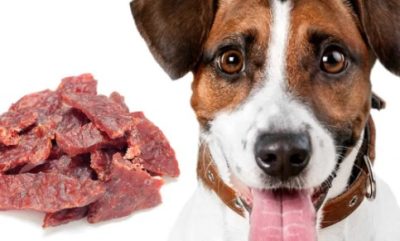Dogs should not eat beef jerky as it can harm their health. Beef jerky is a popular snack among humans, but when it comes to our furry four-legged friends, it is best to steer clear.
Beef is a great source of protein for dogs, but the jerky form can be problematic. Most beef jerky in stores contains high levels of sodium, preservatives, and flavorings that can harm dogs. Some beef jerky brands may also have garlic or onion powder, which is toxic to dogs.
Table of Contents
What is Beef Jerky?
Beef jerky is made from beef cut into strips, dried at low temperatures, and often seasoned with spices and flavorings. The low-heat drying process removes moisture from the meat, inhibiting bacterial growth and allowing it to be stored without refrigeration.
This drying and curing process creates a chewy, shelf-stable meat snack packed with protein. Beef jerky can be a healthy treat when eaten in moderation, but it can be high in sodium, spices, and preservatives.
Can Dogs Eat Beef Jerky?
Beef jerky can be a tasty treat for dogs, but there are some essential considerations before feeding it to your pup. The drying process makes jerky shelf-stable and concentrated in protein. That can benefit dogs by providing nutritious meat protein without much fat.
The chewy texture also satisfies dogs’ instinct to chew while exercising their jaws. Additionally, jerky’s low moisture content means it’s lower in calories than many other treats. That makes it suitable for dogs with weight concerns. Jerky is also conveniently shelf-stable, making it easy to keep on hand for traveling or training.

However, the high sodium of jerky used for preservation can be harmful, especially for dogs with certain health conditions. Spices and flavorings may also cause gastrointestinal upset, vomiting or diarrhea.
Health Implications Of Beef Jerky
While beef jerky can make a tasty treat, there are some health considerations to be aware of before feeding it to your dog.
Sodium Content
One of the biggest concerns with commercially made beef jerky is its high sodium content. Most brands use copious amounts of salt and sodium-rich spices to extend shelf life and enhance flavor. While minimal amounts may be alright, too much sodium can be harmful to dogs, especially those with kidney disease, heart disease, or hypertension.
Gastrointestinal Effects
The rich spices and flavorings frequently used in jerky may irritate some dog’s stomachs, causing vomiting, diarrhea, or excessive gas. It’s best to introduce new jerky flavors slowly and in small quantities to see how your dog tolerates them. Make sure plenty of water is available as well.
Choking Hazard
The chewy, dried texture that makes jerky enticing can also pose a choking risk, particularly for gulpers or dogs attempting to swallow large pieces whole. Constantly monitor your dog while eating jerky and avoid leaving them unattended. Breaking jerky into small pieces can further minimize choking risks.
Food Processing Concerns
There have been reports of dogs falling ill after eating sure jerky treats and chews. Some processing methods, preservatives, and additives may be possible culprits.
Weight Gain
While jerky can be lower in calories than many treats, dogs who consume too much may still gain excess weight. Moderation is key for dogs needing more exercise.
Preparing Dog-safe Beef Jerky
Opt for lean cuts, such as sirloin or top round, and trim excess fat. Fat can cause digestive upset in dogs, so removing it before drying the meat is best.
Also, avoid using seasonings or marinades containing garlic, onion, or other harmful additives. These ingredients can be toxic to dogs and should never be included in homemade beef jerky for your furry friend.

Instead, use simple, dog-friendly ingredients and consider adding natural flavor enhancers, such as peanut butter or sweet potato, to make your homemade beef jerky even more enticing for your pup.
Portion Control And Frequency
When giving dogs beef jerky, paying attention to portion control and frequency is crucial. Dogs should be given jerky as an occasional treat and should not replace their regular balanced diet. Overindulgence can lead to potential health issues such as upset stomach, diarrhea, or obesity.
| Dog Weight | Serving Size |
| Small (under 20 lbs) | 1-2 small pieces |
| Medium (20-50 lbs) | 2-3 small pieces |
| Large (50+ lbs) | 3-4 small pieces |
The serving sizes are general recommendations. Each dog’s needs may vary based on size, activity level, and overall health. Always consult a veterinarian before introducing any new food or treat into your dog’s diet.
Allergic Reactions To Watch For
Watch out for allergic reactions in dogs when feeding them beef jerky. Dogs can be allergic to certain ingredients in the jerky, leading to symptoms such as itching, vomiting, and diarrhea. Monitor your dog closely for any signs of an adverse reaction.
Symptoms of beef allergies
Dogs can sometimes have allergic reactions to beef jerky. It is essential to be aware of the symptoms and take immediate steps when noticing any signs of an allergic reaction.
- Itching and scratching
- Redness and inflammation
- Hives or rashes
- Swelling, especially around the face, lips, or throat
- Vomiting or diarrhea
- Difficulty breathing
- Excessive drooling
- Lethargy or weakness
If you notice any of these symptoms, immediately alleviating your dog’s discomfort and potentially preventing a more severe reaction is essential.
What To Do If Your Dog Ate Beef Jerky
Beef jerky may be tasty, but dogs overeating jerky can cause problems. Here’s what to do if your dog got into the jerky bag and ate a concerning amount.
- Assess how much they ate: Keep jerky bags out of reach, but if your dog got ahold of one, check how much is missing. Large quantities can be more problematic.
- Watch for signs of GI upset: Vomiting, diarrhea, excessive gas, or loss of appetite may indicate jerky isn’t sitting well with your dog’s stomach. Withhold food initially, but call your vet if symptoms persist for more than 24 hours.
- Monitor chewing and swallowing: Choking is a risk if your dog scarfed down large pieces of jerky. Look for gagging, trouble swallowing, or jerky pieces stuck in the throat and contact your vet or emergency vet immediately.
- Check for excessive thirst or urination: The high sodium levels in jerky may temporarily elevate your dog’s blood sodium. That leads to increased thirst and urination as their kidneys work to excrete the excess. Provide ample fresh water.
- Avoid any intense exercise: Eating a large amount of jerky may cause abdominal discomfort, so refrain from strenuous play or walks for several hours. Rest and relaxation will help your dog digest.
- Call your vet with concerns: If any problematic symptoms develop after a jerky binge, don’t hesitate to call your veterinarian, especially if your dog has underlying health conditions. They can advise you on any needed care.
FAQs on Can Dogs Eat Beef Jerky
Can Dogs Eat Beef Jerky As A Treat?
Dogs can eat beef jerky as a treat, but you should give them in moderation and without seasoning. However, check for any additives or seasonings that may harm dogs.
Is Beef Jerky Safe For Dogs With Allergies?
Beef jerky may be unsafe for dogs with allergies as it can contain potential allergens like soy, gluten, or certain spices. Always consult a veterinarian before introducing new treats to your dog’s diet.
How Much Beef Jerky Can I Give My Dog?
The amount of beef jerky you can give your dog depends on their size, age, and overall health. It’s best to start with a small portion and monitor their reaction. Avoid overfeeding to prevent digestive issues.
Are There Any Risks Associated With Dogs Eating Beef Jerky?
While beef jerky can be a tasty treat for dogs, there are risks associated with it. It can be high in sodium and may contain preservatives or additives that are harmful to dogs. Continuous consumption can also lead to weight gain or digestive problems.
Final Verdict
Beef jerky can make a nutritious, low-calorie chewing treat for dogs in moderation. When choosing store-bought jerky, read labels carefully and look for natural, low-sodium options. Make your own from quality beef and dog-safe seasonings for the healthiest jerky.
Supervise your dog with any jerky treat, and introduce new flavors slowly. Cut it into bite-sized pieces appropriate for your dog’s size.
















